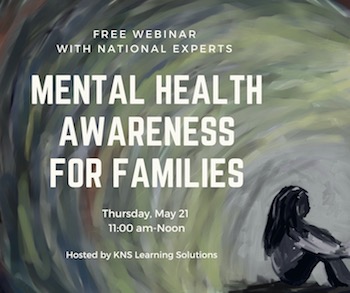Blog
Preventing A Second Pandemic
Author: Kathleen Nelson-Simley
Posted: Friday - May 15, 2020
I recently saw a meme on Facebook that had been shared by thousands of people. It was a fictional story of a child asking his grandparent, who was a child during the 2020 coronavirus, what that scary time must have been like. The grandparent shares that he doesn't recall the fear or anxiety, but only remembers that it was a wonderful time at home with his loving family.
Sadly, many families and children across the nation will not think back to this time so fondly. From a loss of employment or cuts in pay, increased stress in relationships, food insecurity, unreported physical/emotional abuse, uptick in substance use, to a loved one's death without proper closure, the list of damaging stressors goes on for some families.
As I’ve mentioned numerous times in previous blogs, the coronavirus pandemic is unlike anything we have ever experienced. Consequently, there's no way of knowing what the long-term emotional effects of living through it will really be on families.
One thing we do know, however, is that the incidence of mental health increases when there are traumatic events in our life, especially during childhood. So, let’s be honest. COVID-19 has been a stressful and traumatic experience for ALL of us. We have all been negatively impacted by it in some way or another.
But, unlike many other stressful events in our life, this one is ongoing and open-ended. There is no end point to it. The longer it continues, with little to no light at the end of the tunnel, the more likely stress will build up over time - creating a perfect storm for negative emotional, mental and behavioral reactions from any one of us, including kids. If kids were experiencing an ever-changing crisis with no other red flags, it would be hard enough to manage. But, other factors make the current situation for them even more alarming from a mental health standpoint.
For one thing, the sudden loss of all things normal can be incredibly destabilizing for kids right now. A child's environment can stabilize his or her life. But an environment filled with uncertainty and drastic departures from routine can leave them reeling and increase emotional distress and behavioral disruption. The lack of structure and normalcy can overwhelm their already-limited coping skills.
The daily support systems many kids depended on to thrive and survive has also been disrupted and disbanded. Peers and adults who served as positive role models, mentors, coaches, cheerleaders and counselors to kids outside of their homes every day are void or limited. An increase number of kids report feeling more isolated and deserted right now leading to added emotional and mental stress.
And, even when kids do return to their daily in-person activities of school, afterschool and other extracurricular activities, the likelihood of existing strict public health protocols could still have an adverse effect on their mental health. Stressors carried into the classroom can impair their learning and developmental growth and make it impossible for them to concentrate and learn during the school day.
The bottom line is…We have to approach our current situation with kids and families differently from other traumatic events because never before have we seen all of these significant risk factors simultaneously and lasting with no end in sight.
For the past month I’ve been writing about the importance of preparing a response to your students' emotional and mental needs during this time of physical isolation, as well as when they return to your school or community-based program. Anticipating their needs now will better prepare you with a thought out, timely, calming and non-threatening response to their needs.
I promised to offer you opportunities to learn from some of the best national experts who could help you think through and plan for your response. Last week’s webinar on “How to Bring Restorative Practices to Your Students” was one of those opportunities. The response to it was overwhelming - to say the least. Based on the feedback I received, I think I can speak for the hundreds of you who attended the webinar that it was thought-provoking, spot-on and an approach many of you believe is very beneficial to use with your kids.
I am going to offer you another learning opportunity that I believe will be just as eye-opening and timely. I am bringing together some of the best national experts on mental health wellness with kids and families in a free webinar next Thursday, May 21, from Noon-1:00 pm EST.

I am proud to be able to host this webinar for you. It’s a webinar that has been offered nationally in the past few weeks and fills to capacity each time it is held. The panel of speakers featured in the webinar are some of the best in the field when it comes to working with youth and families, having the most up-to-date information on mental health concerns and offering helpful and practical ways you can proactively support families and kids (maybe even your own) on mental health wellness during this pandemic.
Registration will open on Monday, May 17. Contact me to receive the registration information. Register early to ensure your seat because if history repeats itself it will fill up quickly.
When you receive the webinar invite, pass it along to parents and families you serve, colleagues, your own family members or people you know who are worried about someone they love or are personally struggling themselves. We ALL need to be well equipped with the best information so we can best care for ourselves, our loved ones and those we serve. It may just prevent a second pandemic - a mental health crisis.



